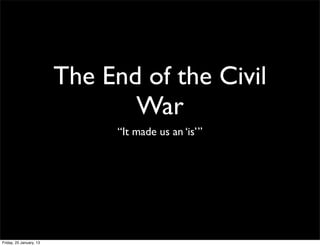
Why the North Won: Key Factors in the Union Victory
- 1. The End of the Civil War “It made us an ‘is’” Friday, 25 January, 13
- 2. Why the North Won Confederacy was weak to begin with Mostly agricultural Friday, 25 January, 13
- 3. Why the North Won Poor political and military leadership Davis was no Lincoln Friday, 25 January, 13
- 4. Why the North Won Lacked communication capacity Lacked infrastructure Friday, 25 January, 13
- 5. Friday, 25 January, 13
- 6. Why the North Won Did not have population or resources of North Friday, 25 January, 13
- 7. Friday, 25 January, 13
- 8. Why the North Won Food shortages Morale problems Friday, 25 January, 13
- 9. Why the North Won Yet, the South still persevered for four years, giving the North a run for its money. How? Robert E. Lee Friday, 25 January, 13
- 10. Robert E. Lee, the Confederate General who surrendered to Grant in 1865 put it well: “After four years of arduous service marked by unsurpassed courage and fortitude, the Army of Northern Virginia has been compelled to yield to overwhelming numbers and resources.” Friday, 25 January, 13
- 11. Why the North Won What do the historians mean in their comments in the first clip from Ken Burns’s Civil War? Friday, 25 January, 13
- 12. Who Won the War? Why does Barbara Fields say slaves won and lost in the Civil War? Friday, 25 January, 13
- 13. “I think what we need to remember, most of all, is that the Civil War is not over until we, today, have done our part in fighting it, as well as understanding what happened when the Civil War generation fought it. William Faulkner said once that history is not "was" it's "is." And what we need to remember about the Civil War is that the Civil War is in the present as well as the past. The generation that fought the war, the generation that argued over the definition of the war, the generation that had to pay the price in blood, that had to pay the price in blasted hopes and a lost future, also established a standard that will not mean anything until we have finished the work.You can say there's no such thing as slavery, we're all citizens. But if we're all citizens, then we have a task to do to make sure that that too is not a joke. If some citizens live in houses and others live on the street, the Civil War is still going on. It's still to be fought and regrettably, it can still be lost.” Friday, 25 January, 13